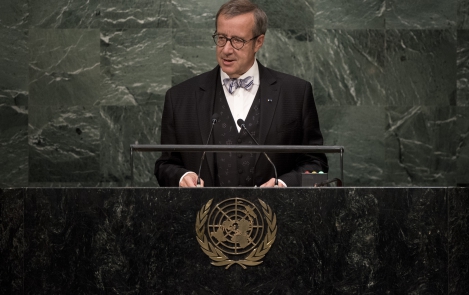-
Reset
+


President Ilves at the summit on sustainable development: we can’t achieve sustainable development at the expense of human rights
27.09.2015
"The current refugee crisis is the result of a lack of long-term solutions. Peace, security and the protection of human rights are the main guarantees for sustainable development. Today, we have to admit that there are serious challenges in Syria and Ukraine, as well as a number of other countries," said President Toomas Hendrik Ilves in his address at the UN sustainable development summit, where sustainable development goals for all countries for the next 15 years were established.
The speech of the President focused on human rights, corruption, the principles of a state based on the rule of law and good governance practice, as well as the importance of information technology solutions for the achievement of sustainable development.
President Ilves emphasised that the problems we face at global level are complicated and closely intertwined – this applies to military conflicts, forced migration, weak economies and corrupt governments, as well as poor education and climatic changes. Therefore, according to the Estonian Head of State, the solution can only be achieved by employing a comprehensive approach, not by solving individual problems.
"Above all, governments hold the keys to the development of society. A strong and democratic government will ensure the running of a state based on the rule of law, protection of human rights, freedom of speech and the internet, and the independent functioning of media and social media. An agreement upon sustainable development goals at the level of states must involve the implementation of real changes – economic, social and environmental – by the very same governments," told President Ilves.
In his address, President Ilves emphasised the role of information technology in the development of societies. "It is time for leaders to admit the potential offered by information technology. Estonia is living proof that information technology solutions are the drivers of economic growth and human development," stated the Head of State.
By adopting the goals of sustainable development, countries have for the first time in history agreed upon common priorities, regardless of the development levels of countries. For Estonia, it is important that the goals to be implemented from 2016 onwards will take into account the fact that human and economic activities must be within the limits set by the natural environment. As for the key principles behind the goals, democracy, human rights, good governance practice, a state based on the rule of law, non-discrimination and gender equality can be highlighted as the most important for Estonia.
Background information: Sustainable development goals represent a follow-up to the eight Millennium Development Goals (MDG), which were applicable to developing countries in 2000-2015 and focused on reducing poverty. Unlike the Millennium Development Goals, the new goals are universal or binding for Estonia too. These are also more extensive and involve three dimensions: social sphere, economy and the environment. Sustainable development goals represent a new, universal set of goals, directions and indicators, which are to be observed by UN member states over the next 15 years to prepare their action plans and policies. The adopted 17 targets and 169 topics are divided into six categories: dignity, people, prosperity, planet, justice and partnership. For additional information, please see: http://seit.ee/et/valdkonnad/saastva-arendamise-meetodid/saastva-arengu-eesmargid-ja-nende-loimimine-poliitikasse
Office of the President
Public Relations Department




